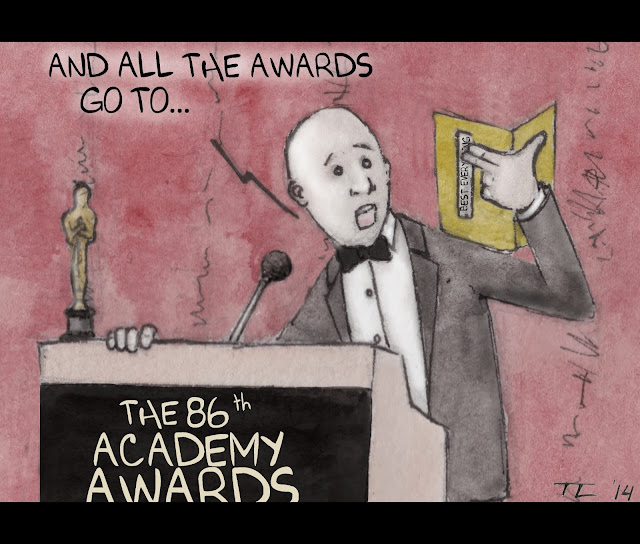February, 1961. New York. Llewyn - who I can't stop calling Llewellyn - is on the stage at the Gaslight Cafe singing "Hang me, oh hang me". For the three minutes the song lasts Llewyn Davis seems soulful, thoughtful, and compelling. He isn't. It takes perhaps another three minutes to get that. Every minute afterwards just clarifies it. Since the shortest accepted running-time for a feature film is (roughly) 72-minutes it's unlikely Inside Llewyn Davis would be released if it were 6-minutes long... But it would have been a better film.
The story runs thusly: there isn't one. Not really. Llewyn is an aspiring musician who sleeps wherever he can beg a couch. He's good at what he does, but not quite good enough. He's wrung out, tired, and close to giving up. He has family, and some friends who can still bear the sight of him, but he drifts in and out of their lives, leaving minor chaos in his wake. Very minor. He accidentally locks a cat out of its home (and carts it around with him for most of the film); he heckles a performer; he gets a friend pregnant; and he reduces one of his hosts at dinner to tears. Little of it makes an impression on him. Although he does seem a little sorry about the cat. That's about the sum of it. As Coen brother number one (Joel) said of the film: '[It] doesn't really have a plot [...] that's why we threw the cat in.'
It opens well enough, quickly setting the scene - almost any shot in the film could pass for a 60s folk album cover - and the music, to my layman's ear, fits credibly into the era; but the film never escapes the first act. Instead of a second act we get the opposite: act nought. (Or perhaps 'act minus one'.) Even when the film becomes a road movie and Llewyn has a clear destination, it never shakes its aimlessness. The lack of momentum is then compounded by the film's elliptical structure, which, although elegantly done, gives the impression that not only is Llewyn stuck in purgatory, we're stuck in it with him. Which doesn't make for the most rewarding cinema experience.
Inside... still feels like a Coen brothers film, thanks to the fantastic casting done by Ellen Chenoweth (who particularly excels at casting doddery old secretaries), but there's little to the script, which leaves everyone somewhat adrift: Oscar Issac expertly handles the singing but inspires little more than indifference as Llewyn; Carey Mulligan, a fellow folk singer (and one time fling), hurls out insults with an anger that seems paper thin; and John Goodman, as a random jazz musician, follows Mulligan's lead and shouts and bellows to make up for lack of characterisation. No one else fairs much better. Except perhaps the cat; the film's most interesting character. And I'm only being slightly flippant in writing that. (Behold as he wrestles with themes of identity and gender!) He's certainly the most likeable character. Whilst others do nothing, he acts. This is known as 'having agency'. Shame none of the humans do.
Overall: 5/10



